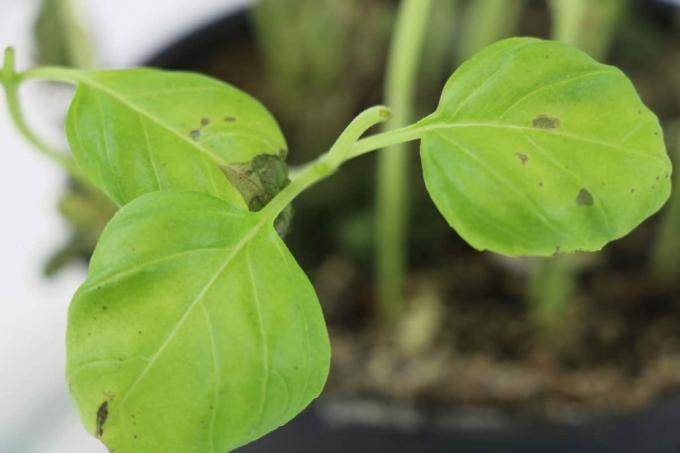
table of contents
- cold
- warmth
- care
- to water
- Parasites
- frequently asked Questions
basil is one of the most popular culinary herbs and is not only used for consumption, but also as a defense against insects used. However, if it develops black spots, the care should be checked carefully.
In a nutshell
- Basil can get black spots from the cold
- Burns are possible in summer
- Cold damage and incorrect care are the most common causes of black dots
- Growing basil yourself can prevent problems
cold
Above all, the basil does not get hold of cold, damp air and makes the aromatic plant susceptible to fungal attack, which can cause black spots. Due to its origin, the aromatic herb is comparatively sensitive. Even transportation in a poorly insulated truck can be enough to cause cold damage to the plant.
It is difficult here that black dots usually do not appear immediately due to a too low temperature, but rather with a time delay. The cause can therefore be long before the purchase. While the basil still looks fresh and healthy in the supermarket, problems quickly appear in the home kitchen.
However, this can be prevented by taking the appropriate action. These include:

- basil pull yourself
- Buy in nurseries and not in the supermarket
- Avoid temperatures below 15 ° C
Tip: Even in summer, nighttime temperatures can drop below 15 ° C. Therefore, the plant should be indoors to be on the safe side or at least put inside at night.
warmth
High temperatures, or more precisely sunlight, can also create black spots on the leaves of basil. Instead of fungus or cold damage, however, it is burns.
The risk of this is increased when dew drops or rainwater accumulate on the leaves. These drops act as lenses and concentrate the sunlight. As a result, punctual burns not only occur faster, but also turn out to be stronger and darker in a shorter time. Recognizing the difference between cold damage and burns is not only difficult for laypeople. In any case, the points are similar and the culture conditions must be checked.
care
If the growth is weakened, mushrooms can spread faster and more easily and create black spots. In addition, the chances of a full recovery from damage are lower. With the right measures, however, it becomes possible on the one hand to prevent problems and on the other hand to save the plant in the event of already existing damage or infestation with pathogens. The measures are:
-
Recognize the reason: Is the location too cold or is there too much direct sunlight on the leaves? Is there a high level of humidity? Even these simple questions can reveal whether there is a problem with the culture. If the care conditions are already optimal and the basil has been newly purchased, it must be assumed that it was damaged during transport or that it was previously stored in an unfavorable manner.
-
Care: Above all, correct pouring should be taken into account. If watering is wrong, problems quickly arise. The right fertilization is also crucial. Coffee grounds, horn shavings, nettle liquid or compost are suitable household remedies. However, you can also use special herbal fertilizers. The additional nutrient supply should take place weekly from May to September.
-
Protection: The Mediterranean spice does not tolerate sudden changes. Suddenly changing location or peeling off the film too quickly can also create problems. Slow changes are better. Remove the packaging piece by piece and slowly move the planter to another position.
- Harvest and blending: A comparatively strong harvest in combination with the right care is ideal if there are already black points. However, removing the affected leaves only prevents the fungus from spreading. This does not prevent burns or black spots caused by temperatures that are too low.

to water
Especially with regard to watering, the plant is prone to care errors. Therefore, you should pay attention to a few points:
- Water must be at room temperature
- Watering should be done from below
- Avoid waterlogging
- use soft water with a low calcium content
- but often water in small amounts
Tip: Tap water is often very hard. Better options for watering the basil are rainwater, pond water, aquarium water or even stale or filtered tap water.
Parasites
Ocimum basilicum - as the Mediterranean culinary herb is called in botanical terminology - is rarely attacked by parasites. In fact, the plant becomes active against Pests used and is therefore wonderfully suitable for mixed plantings as a natural defense.
Only snails use the leaves as a source of food. In the case of black dots, it must not be assumed that it is a pest infestation.
frequently asked Questions
Herbs bought in the supermarket have already been transported for a long time. This can lead to a build-up of moisture and both temperatures and lighting conditions can fluctuate. It is therefore not surprising that the growths often show signs of damage or even die after a few days. This problem does not exist with home-grown plants.
In addition, a correspondingly resistant variety can be selected for your own sowing.
If a protected location is chosen and the temperatures are above 15 ° C. Direct midday sun should be avoided. East and west are therefore ideal. Since the plant suffers quickly in cooler temperatures, strong winds should also be avoided.
Even if black spots appear on the leaves of the basil, the plant can still be saved. The removal of the affected parts of the plant and the adjustment of the care is often enough. A change of location can also be useful.
If the basil leaves are still to be consumed, no harmful substances may of course be used. As a precaution, leaves that are discolored should not be eaten as the cause could be fungi.

